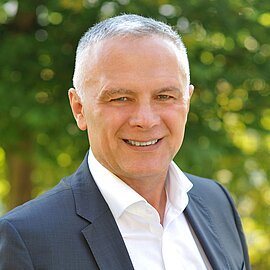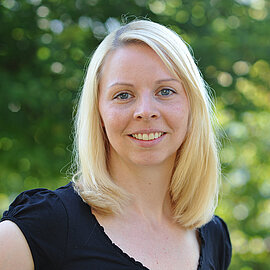The German raw milk market has experienced a dramatic price decline of more than 40 percent over the last two years. The low milk prices in Germany are attributed above all to the expansion of production resulting from the liberalization of the milk market as well as declining export demands following Russia’s import ban and the slump in Chinese import demands. In order to provide a platform to discuss the current issue with experts from the milk sector, IAMO, in cooperation with the German Agribusiness Alliance of the Committee on Eastern European Economic Relations (OA), held a forum on ‘Milk, Market, and Power: Who Influences the Milk Price?’ at the EuroTier in Hanover, Germany, on 17 November 2016. More than 100 participants followed the controversial panel discussion which examined the topic from a scientific, political, and practical perspective.
IAMO scientist Aaron Grau welcomed guests to the event with an introductory statement. He outlined the developments that have affected the milk market in the last years. The gradual easing of the milk quota system and its ultimate abolishment in April 2015 led to a massive expansion in production. In comparison to Germany, production in the neighboring EU countries and worldwide has expanded even faster. These increases in production were accompanied by an intensive structural change. From 2004 to 2015, around one third of all milk producers were forced to discontinue production. The number of diaries also reduced considerably despite the growth in their processing capacities. Regardless of these changes, farmers and dairies still find themselves subjected to a highly concentrated food retail sector which remains the main purchaser of their products.
In the ensuing discussion, host Jens-Peter Loy, professor at the Christian-Albrechts-Universität zu Kiel, together with his panel guests, attempted to explain who or what was influencing the milk prices as well as the developments necessary for a more stable milk market.
Price formation in the milk market
In addition to the increasing expansion of milk production in other countries and the disappearance of export markets, Ludwig Börger of the German Farmers’ Association (DBV) tied the low milk price in Germany to market signals not reaching farmers on time, structural problems in dairies, and the market power of the food retailers. According to Romuald Schaber from the German Dairy Farmers Association (BDM), supply and demand are the deciding factors of price in a functioning market. In the current milk market, supply is not adjusted to demand, which has caused the falling raw milk prices. “The profit is primarily going to the food industries involved in further processed products such as chocolate. They benefit from the low milk prices but do not pass these on to the consumer,” Schaber said. Even the dairies, in contrast to the farmers, are interested in the low buying price of raw milk. Sebastian Hess, professor at the Christian-Albrechts-Universität zu Kiel, sees European milk prices being above all influenced by world market prices. “Despite the current low level, milk prices are developing positively over the long term due to the growing import demand in the emerging markets. The problem lies to a much greater extent in the volatility of the prices and to adjust to this is for the dairy farmers a significant challenge.”
Milk price adjustment measures
According to Ronald Schaber, the socially acceptable costs in milk production lie between 40 and 50 cents per liter. Such a price is needed in order to protect the environment and guarantee animal welfare. “To allow the free markets to determine the price of milk cannot lie in the best interests of the common good,” Schaber said. In contrast, Ludwig Börger argued that the liberalization of the milk markets is well under way and milk producers need to adjust to the current market prices. For him market interventions show very little promise and he particularly calls for the cooperative dairies to develop export markets and build brands. Sebastian Hess also added that policies have no effect on the price cycles of milk and the prices should be negotiated individually. Instead of redistribution measures in the form of financial compensation, he recommends that political decision makers invest in consulting services. Access to information and technology are essential conditions for more efficient production and adjustment to market conditions in order to thus counteract the structural change.
Text: 4,636 characters (incl. spaces)
| Press Release 21/2016
Battle over milk prices: challenges and adjustment strategies
Results of the EuroTier forum

About IAMO
The Leibniz Institute of Agricultural Development in Transition Economies (IAMO) analyses economic, social and political processes of change in the agricultural and food sector, and in rural areas. The geographic focus covers the enlarging EU, transition regions of Central, Eastern and South Eastern Europe, as well as Central and Eastern Asia. IAMO works to enhance the understanding of institutional, structural and technological changes. Moreover, IAMO studies the resulting impacts on the agricultural and food sector as well as the living conditions of rural populations. The outcomes of our work are used to derive and analyse strategies and options for enterprises, agricultural markets and politics. Since its founding in 1994, IAMO has been part of the Leibniz Association, a German community of independent research institutes.
Leibniz Institute of Agricultural Development in Transition Economies (IAMO)
Theodor-Lieser-Str. 2
06120 Halle (Saale)
Germany
www.iamo.de/en
IAMO on Facebook: www.facebook.com/iamoLeibniz
IAMO on Twitter: https://twitter.com/iamoLeibniz
Contact

Prof. Dr. Dr. h.c. mult. Thomas Glauben
Director of IAMO
Head of Department Agricultural Markets
Room: 234
